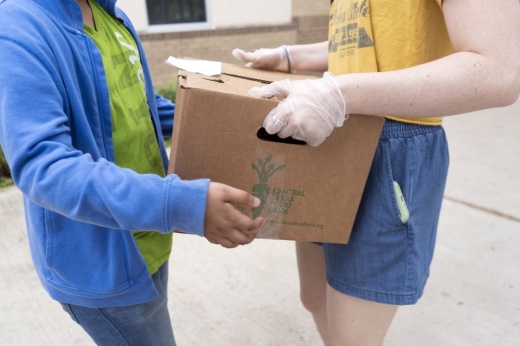In light of concerns regarding the spread of COVID-19 and a state of disaster declaration from Gov. Greg Abbott on March 13, Rollingwood residents are joining together to protect their more vulnerable neighbors.
Rollingwood Mayor Michael Dyson said he is feeling immense pride in the community he represents. He explained that over the weekend, a group of volunteers aided the city in compiling a list of potentially vulnerable residents, including elderly and immunocompromised citizens. Now, if any number of those citizens require assistance with grocery or pharmacy shopping, they can reach out to the city for help.
The list will also enable the Rollingwood Police Department to be conscious of their community members who could be at a higher risk during the current situation.
“We have so many people here that spend their day just being selfless for their friends and neighbors.” Dyson said.”It seems like the exact antithesis of what you see when you walk into H-E-B and see all the empty shelves.”
According to Dyson, Rollingwood residents are not alone in their efforts to aid those potentially impacted by the spread of COVID-19. Organizations and communities throughout the Lake Travis-Westlake area and beyond are making efforts to relieve stress caused by recent coronavirus concerns.
Local businesses come together
Employees at Lakeway’s Whataburger location have come together to support those working on the front lines to keep the community safe, according to manager Michael Benitez.
Benitez and Whataburger staff have been delivering breakfast and lunch to various nurses and grocery store workers in the Lakeway community.
On Monday morning, he and his team headed down the street to the Baylor Scott & White Clinic to drop off breakfast items. Benitez called the act a small token of gratitude.
“We work in the service industry, and we know what it’s like at times to work long hours and under pressure,” Benitez said.
The staff continued their efforts by delivering food to employees at Lakeway’s H-E-B on Tuesday and are planning to bring lunch to Randall’s on Wednesday afternoon.
Benitez said these employees have been “running the gauntlet,” as many grocery stores have seen long lines and depleted shelves.
However, not every business in the Lake Travis area is experiencing an influx of customers. On March 17, Austin Mayor Steve Adler and acting Travis County Judge Sarah Eckhardt ordered all restaurants and bars to stop offering dine-in service and prohibited gatherings of more than 10 people until at least May 1.
Many restaurants, including Green Mango, Vivel Crepes and Tony C’s, have adjusted their business operations, closing their dining rooms while accommodating takeout and curbside orders.
However, some have chosen to close, like Sundancer Grill, which announced a closure effective until May 1.
The Lake Travis Chamber of Commerce has stepped in during this time of uncertainty, using the Facebook page "Support LT local" to continue to voice support for local businesses.
“We encourage you to continue to patronize your favorite restaurants and retailers, among others,” chamber President Laura Mitchell wrote on Facebook. “We’ve already seen a number of establishments offer curbside pickup.”
The chamber is working on a list of businesses offering special delivery or pickup services, according to Mitchell. Local businesses owners would want to want to promote these services should reach out to the chamber.
Supporting nonprofits
Local nonprofit organizations throughout the Greater Austin area are working diligently to aid those who may be physically or economically impacted by COVID-19. With many restaurants closing their doors and switching to take-out orders only, service industry workers could take a financial hit.
The Central Texas Food Bank is stepping in for those who are unable to purchase their own food at this time. The 501(c)(3) nonprofit works with about 250 partner organizations, such as Lake Travis Crisis Ministries, to provide hunger relief to individuals across Central Texas.
According to Derrick Chubbs, Central Texas Food Bank’s president and CEO, the organization is working around the clock to understand how to how to better serve the community during the pandemic. He said they are anticipating a dramatic increase in need throughout upcoming months.
“We distribute food to between 40,000-50,000 Central Texans every week,” Chubbs said. “COVID-19 is going to put numbers on top of that.”
The organization has already seen an increase in clientele, according to Chubbs. One CTFB mobile pantry site, which typically serves between 93-100 individuals daily, recently served 400 people in a day.
“Our traditional clients that expect us to be there for them are no less hungry because of COVID-19,” Chubbs said.
However, obtaining food has proved to be difficult for many because of coronavirus concerns. The Central Texas Food Bank and many of its partners primarily receive donations from grocery retailers, many of which are struggling to maintain stock.
“You’ve seen the shelves,” Chubbs said, adding that due to a lack of available goods, the nonprofit has been purchasing items at market rate, which is much more expensive.
The organization also has to adjust their business model for the time being, according to Chubbs. The food bank is transitioning to a "drop-and-go" style of service, distributing food in grocery bags or boxes to limit hand-to-hand interactions.
Newly purchased cardboard boxes and 150,000 grocery bags will be used to create emergency boxes, which individuals will be able to receive from their cars at a drop-off site. While creating these boxes, volunteers have been keeping a safe distance apart, and shifts have been separated into 20 volunteers at a time, Chubbs said, with the intent to reduce that number to 10.
Despite the apparent strain the virus has placed on the food bank, Chubbs is still encouraging anyone who requires assistance to visit their organization’s website to find a local pantry site in their area.
“The face of hunger isn’t what you think,” Chubbs said. “They are hardworking men, women and families that are caught in the tyranny of the moment of having to decide whether or not they're going to pay their rent, pay their utilities, seek medical care or buy food. We’re here to try to eliminate one of those components.”
Individuals can donate and find available food through the Central Texas Food Bank website. www.centraltexasfoodbank.org





